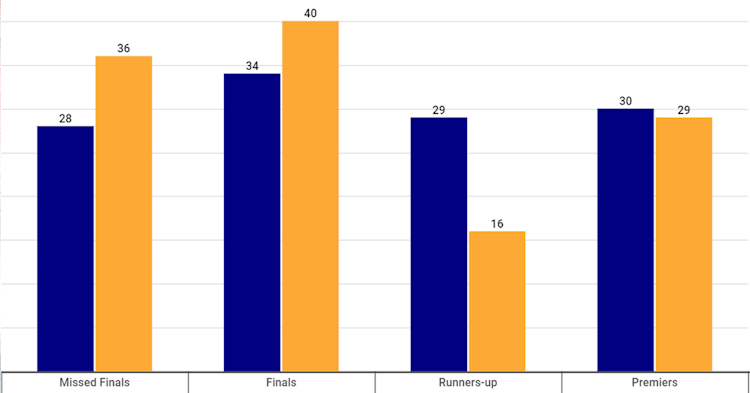Stats And Trends: What Happens To Teams After Losing An AFL Grand Final?
Last updated: Oct 29, 2020, 12:54AM | Published: Oct 27, 2020, 11:04PM
One of the most unique seasons in AFL history came to a close on Saturday night with a result that wouldn’t have surprised too many – Richmond claiming their third premiership in four years courtesy of a comfortable 31-point win over Geelong.
Two of our most recent grand final losers, Adelaide and GWS, have done so poorly in the seasons that followed suggesting that perhaps a grand final loss – particularly a big-margin one – can have a lingering effect on a club’s fortunes.
But do the numbers bear that theory out over a larger sample size? That’s the question we’ll look to answer today, and in doing so give Geelong fans some good news (or bad) on what to expect following Saturday’s disappointment.

This chart shows the next-season result for every grand finalist in VFL/AFL history. Grand final winners are shown in blue, grand final losers in red, and are grouped into four categories based on what they did the next season.
Those four categories are as follows: did not play finals, played finals (but did not play in a grand final), finished runners-up, or finished as premiers.
We can make two conclusions in particular: teams who win a grand final encounter a higher level of success on average, but teams who lose a grand final aren’t any less likely to go on and win the next premiership.
For instance, 30% of runners-up go on to miss the finals in the year that follows, while for reigning premiers, this is a much lower 23%. In fact, 49% of the time – nearly half – the reigning premiers go on to play in the following year’s grand final, compared to only 37% of runners-up.
However, the numbers here suggest that if the reigning premiers do make the grand final in the following year, they’re roughly a 50/50 proposition to win that grand final – having 30 wins and 29 losses.
RELATED: Charting The AFL Premiership Clock: How Far Is Your Club From Its Next Flag?
But when teams who lost a grand final manage to make it again 12 months later, they win roughly two out of three times (29 wins, 16 losses) – perhaps suggesting that a grand final loss in the previous season does makes a team more motivated should they get the chance again.
Of course, this includes a lot of historical data. Does the fate and fortunes of premiership teams playing a century ago really say much about what we can expect in the modern day?
To some degree, yes. Looking at the same numbers just from 1990 onwards – the AFL era – the trends are broadly the same. However, there's some evidence to suggest that grand final losses are hitting teams harder than they used to.

This graph shows every losing grand finalist from 1990 to 2019 positioned according to the margin they lost by in their grand final, along with the number of wins they recorded the next year. And we can see that the bigger the size of the defeat, the less likely that team was to win games in the season that followed.
This is a relationship that isn’t really present if we look at all the historical data from 1898-present, but it clearly exists in the modern era.
Why that is so is anyone’s guess. I would speculate as the game has become more professional, and players and coaches more dedicated, grand final failure – particularly when it’s by a big margin – has become a more intense experience, and more difficult to bounce back from.
We can also see this by looking at the percentage of grand final winners and losers that then go on to win a premiership sometime in the next five years (as opposed to looking at the next-season result only, as we’ve done so far).
The all-time historical numbers show that 50.4% of grand final winners and 47.1% of runners-up go on to win a premiership in the next five years – fairly similar rates of success.
However if we narrow this down to just the last 30 seasons, there’s a much wider gap – 40% of grand final winners have gone on to win another flag in the next five years, yet only 26.7% of losers have been able to do the same.
That suggest two things: one, that repeat premierships are becoming less likely in general, likely due to the impact of equalisation measures and the expansion of the competition, and two, grand final losers are finding it harder than in previous eras to remain in premiership contention.
RELATED: What Brownlow Votes Say About Your AFL Club’s Future
CLOSING THOUGHTS
It’s only natural for the human brain to want to add a bit of narrative to data, and there’s some danger of doing that here.
It’s temping to say the numbers suggest teams who lose grand finals are damaged by that in a way that sees them perform worse than the premiership sides they lost to, but that may not necessarily be true.
After all, the team that won a grand final is probably just a better team than the team that lost it – so it’s reasonable to expect they would naturally be more successful in the years that follow simply because they were and still are a superior side.
Still, the numbers do suggest that in the modern era, teams who lose grand finals are finding it harder to bounce back than they did in the past.
The grand final losers in any given season are probably just as likely to win the next premiership as the grand final winners – but they’re less likely to make the finals, make the grand final, or win a premiership at any time over the next five years.
And, if they lost the grand final in particularly humiliating fashion, it could be a warning sign that they’ll find it hard to notch wins in the year that follows.
Using linear regression, we would predict from Geelong’s -31 margin on Saturday night that they’ll win roughly 15 games next year – which could be more than enough to make the top four and push for the premiership again- even in a full 22-game season.
The numbers have also made a broad suggestion that some grand final losers are extra motivated in the year that follows – as you might well expect.
With Geelong set to land Jeremy Cameron, and perhaps some other big names as well, they’ll no doubt enter 2021 believing it can be a year where – as in 2009 – they back up a grand final loss with a premiership victory.
Did you enjoy this article? Join our free mailing list to get the best content delivered straight to your inbox, or join the conversation by leaving a comment below or on the Stats Insider Twitter or Facebook page.



